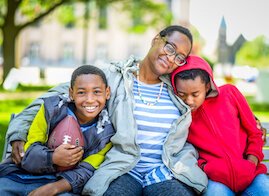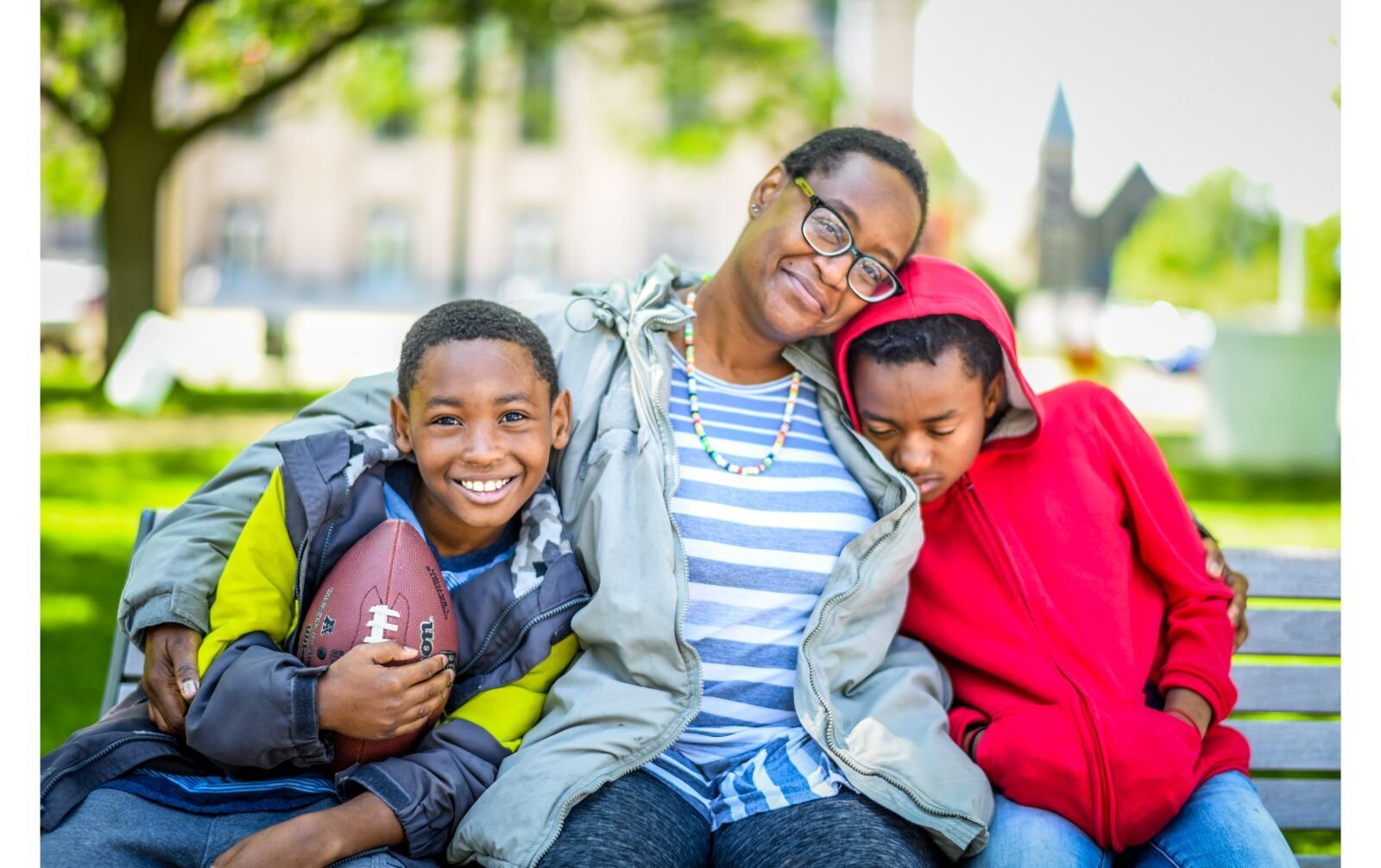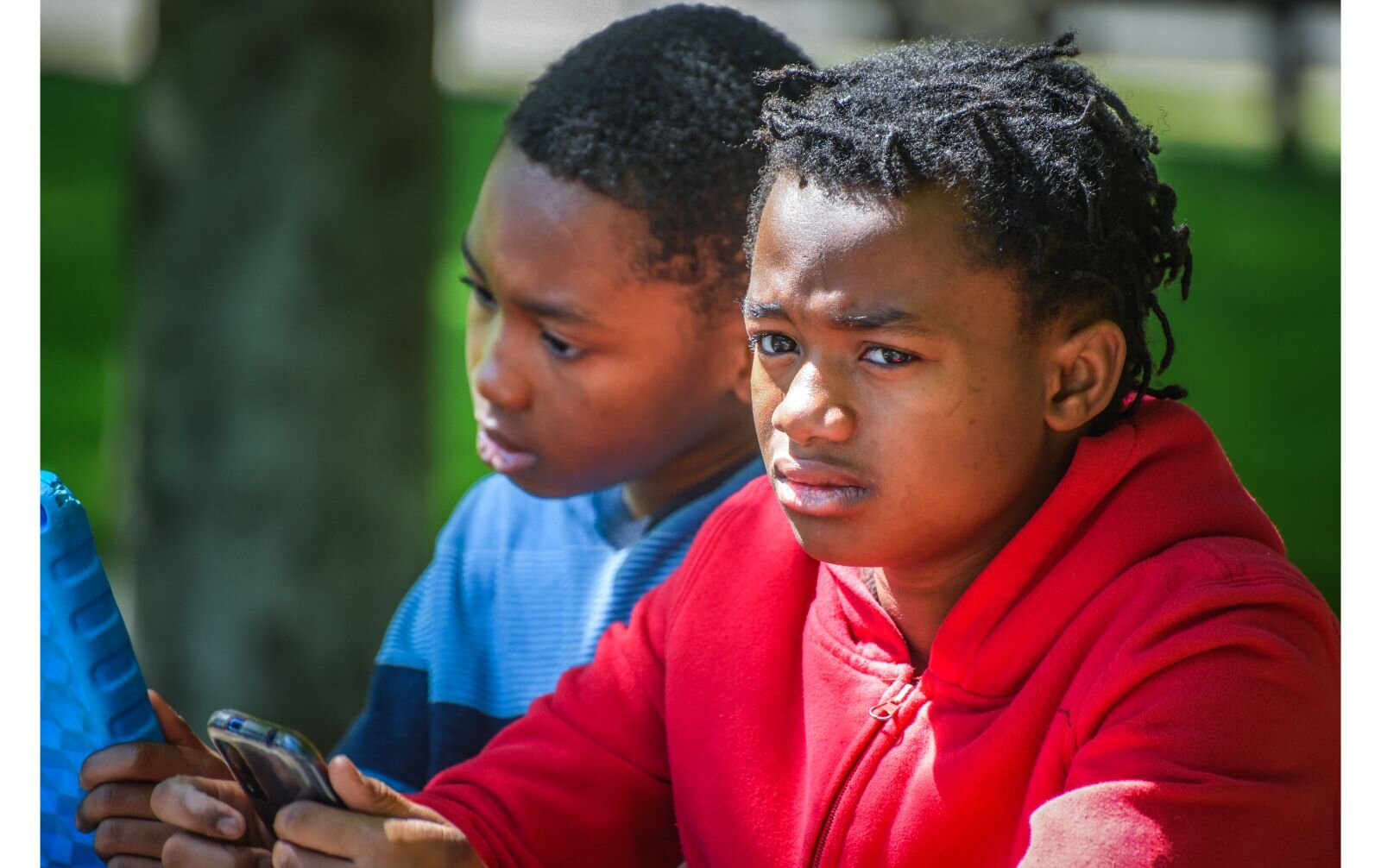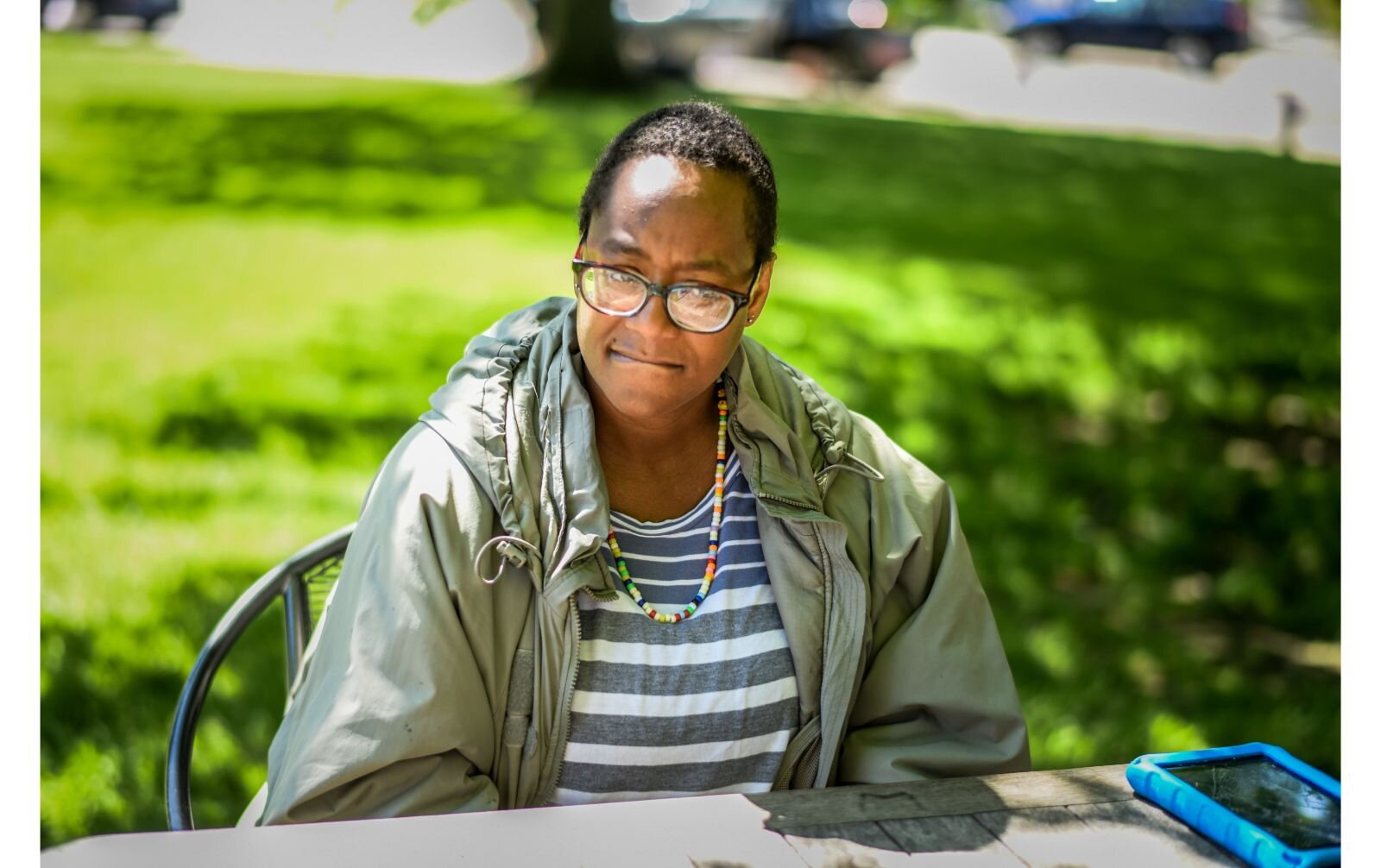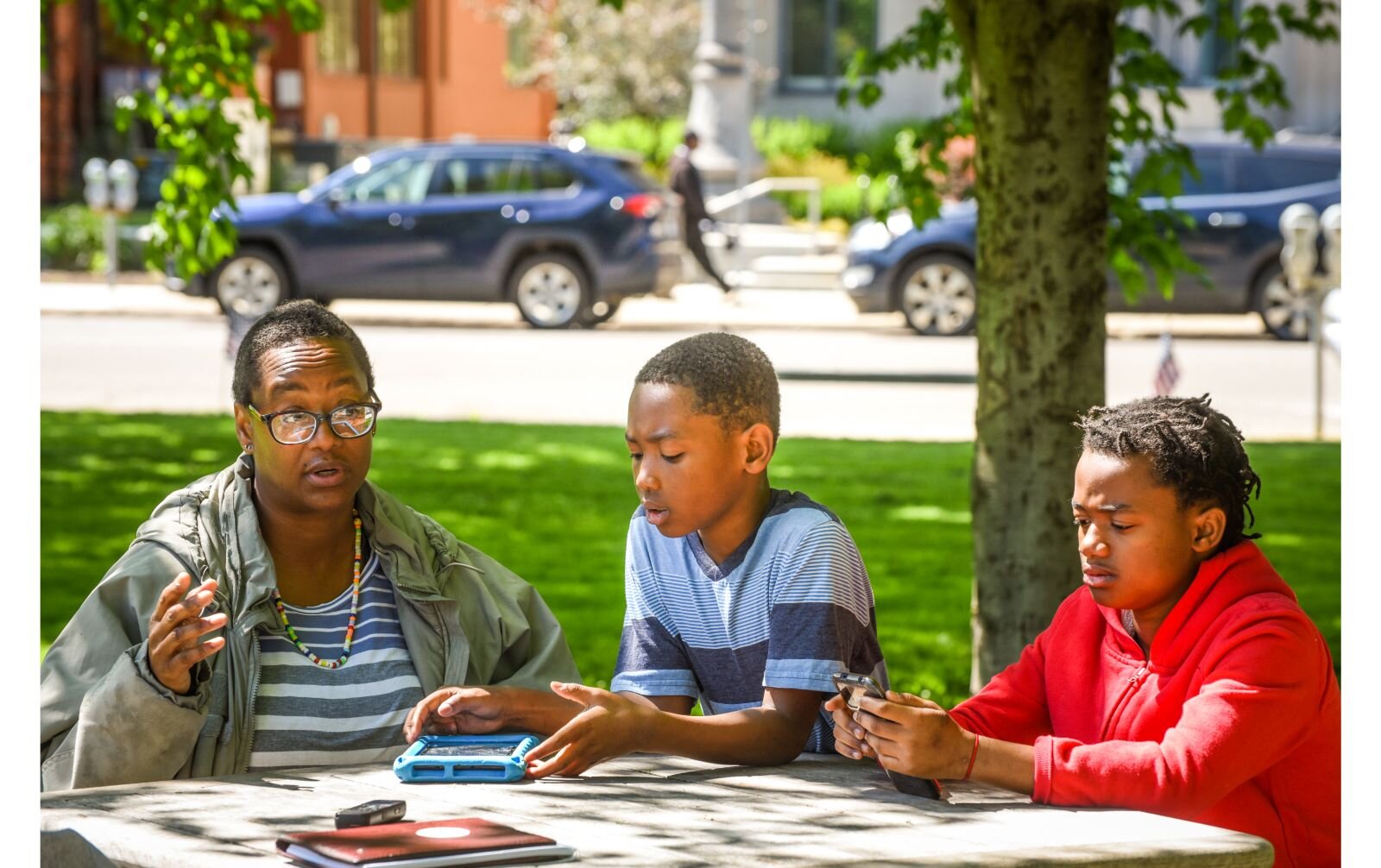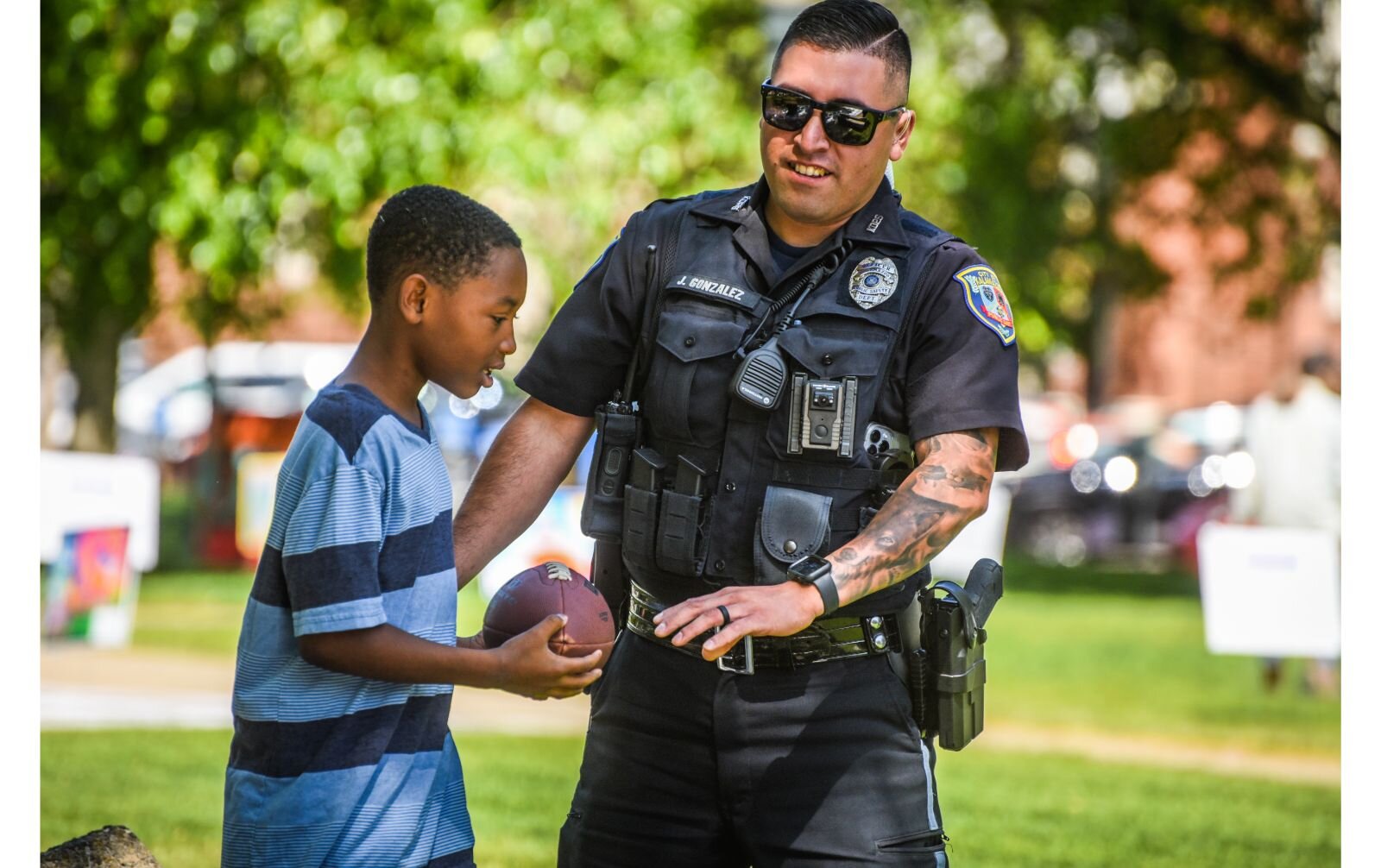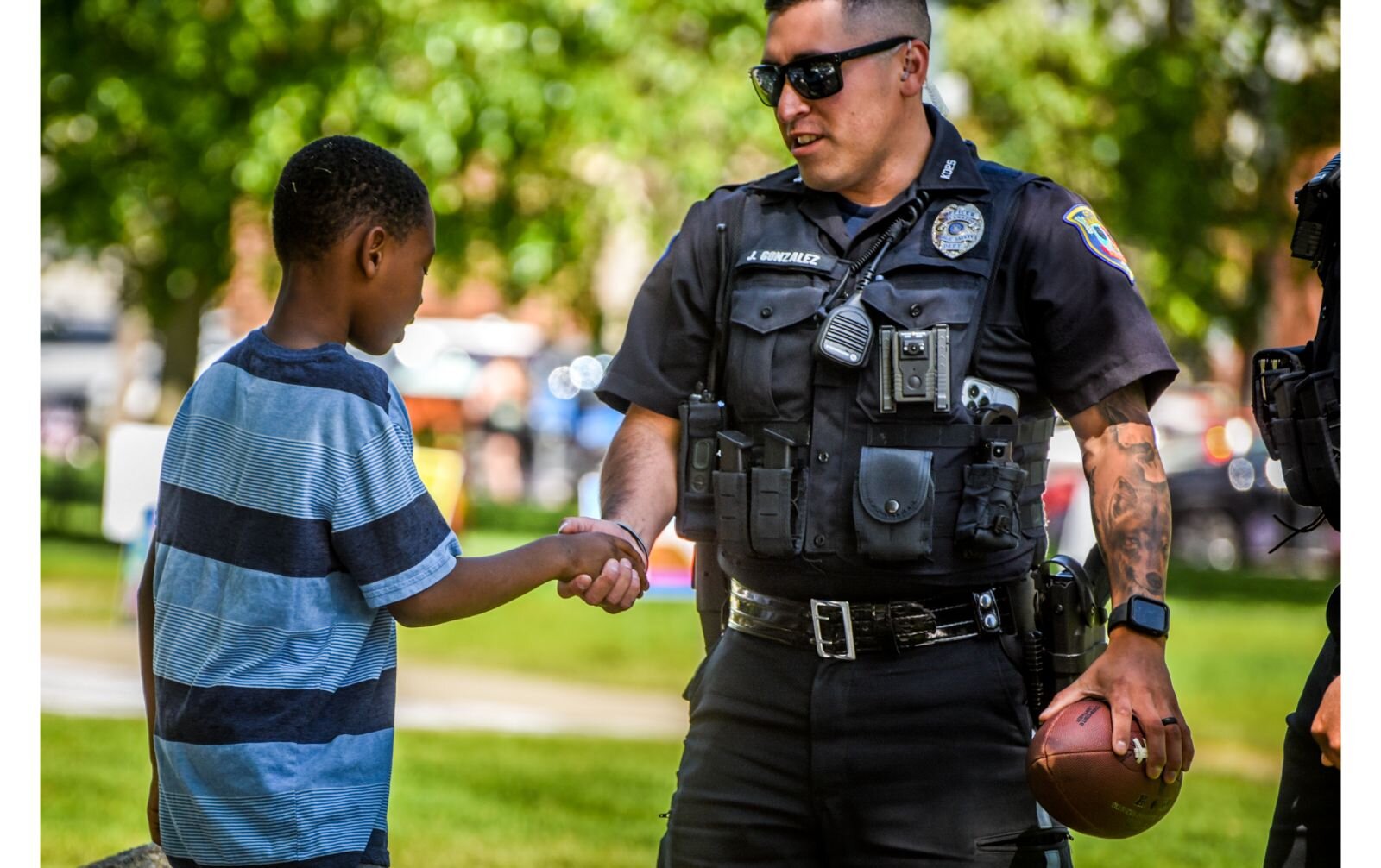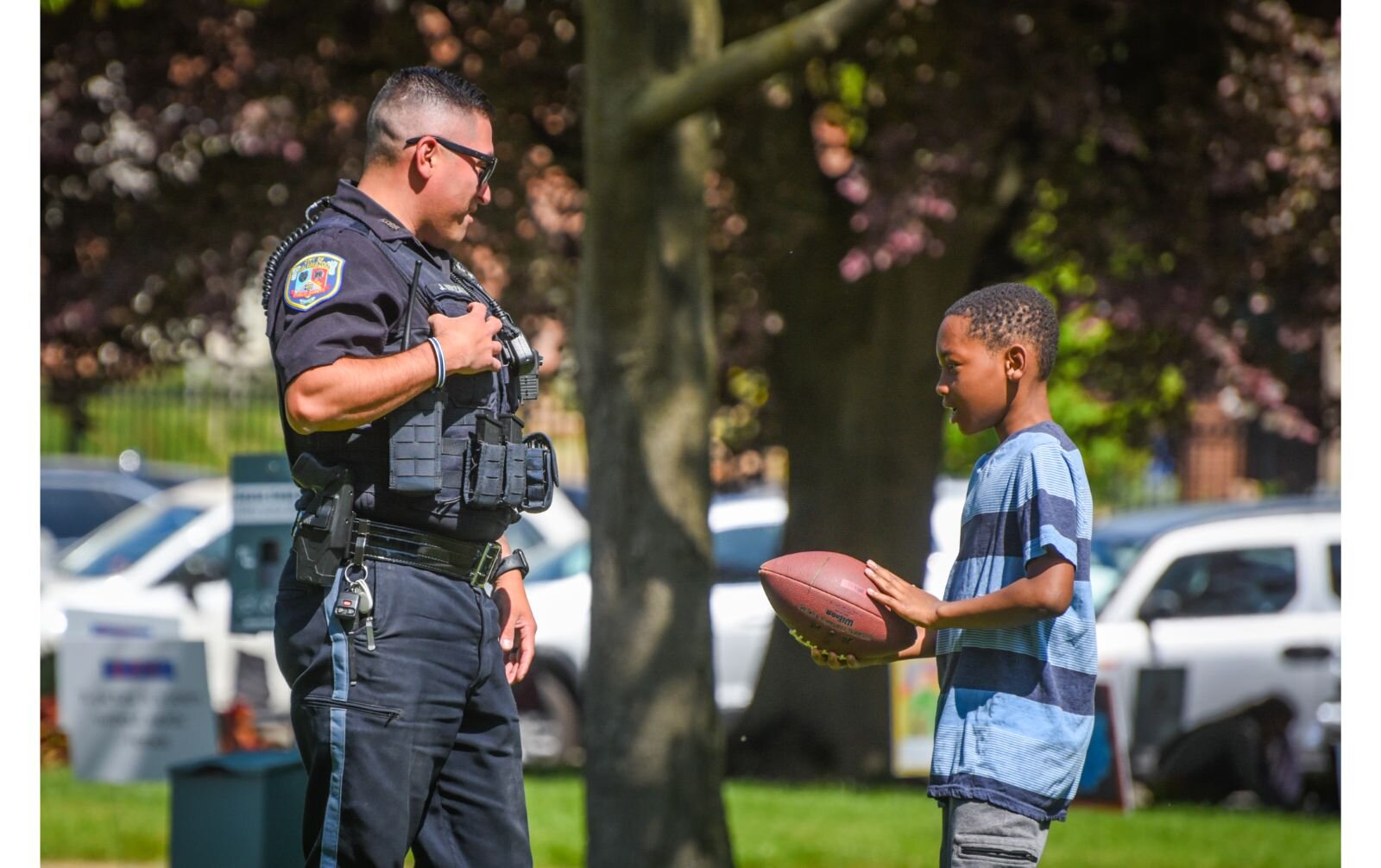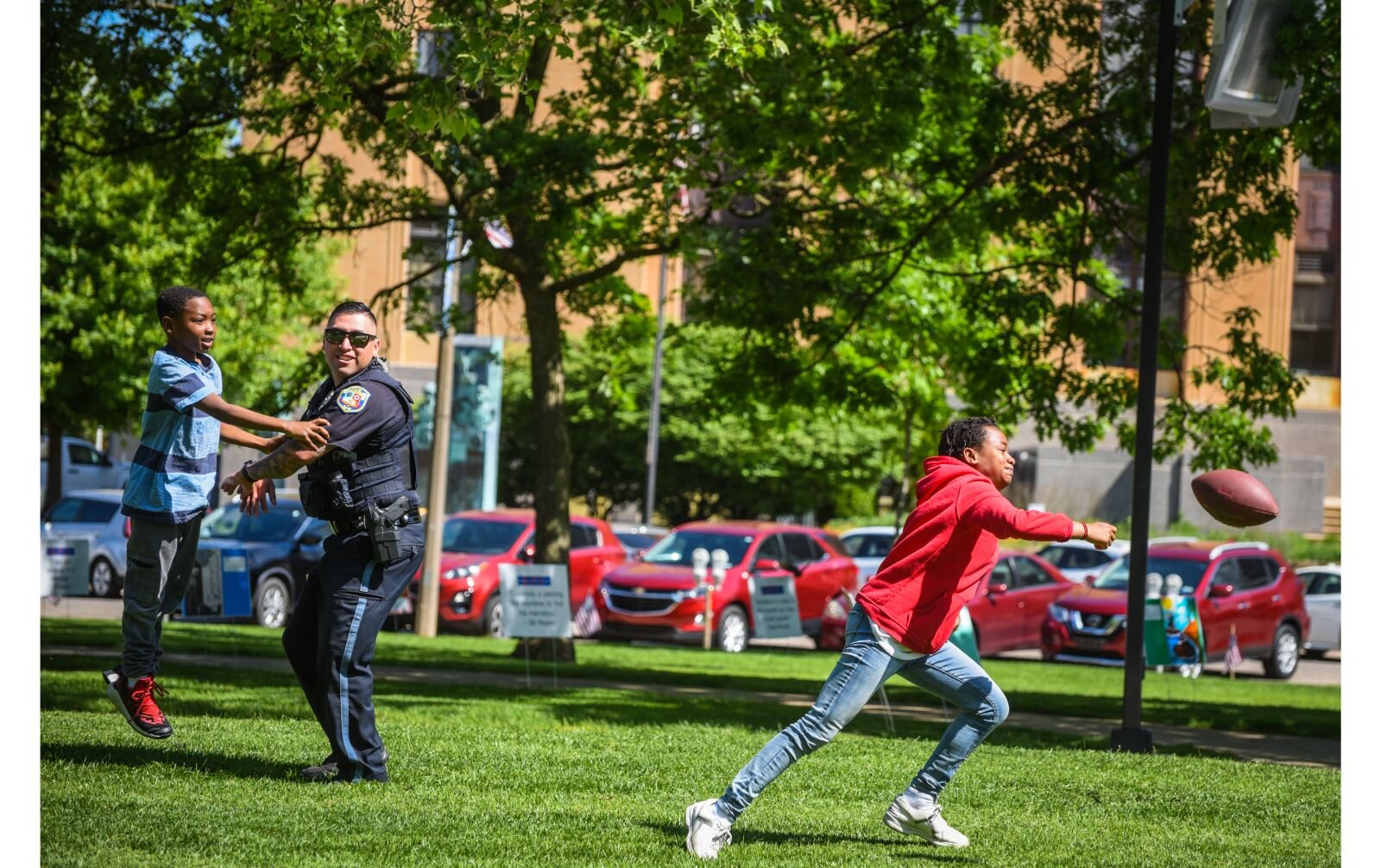Editor’s note: This story is part of Southwest Michigan Second Wave’s series on solutions to affordable housing and housing the unhoused. It is made possible by a coalition of funders including the City of Kalamazoo, Kalamazoo County, the ENNA Foundation, and LISC.
Last September, Tamika Williams grabbed her kids and fled her abusive husband in Albion. Since then, she’s been trying to find a foothold to keep her and her family off the street.
About her former home in Albion, “I was done, I couldn’t do it no more,” she tells Second Wave in an interview in Bronson Park.
Her young children, Elijah and Olivia, were tossing a football in the background with three KDPS officers who’d happened by and chose to do some community engagement. Her third, the oldest daughter, was in school.
Her husband’s abuse “was physical and mental. I had to get out of there.” If she hadn’t left, “I told my kids, I would’ve been in a casket,” Williams says.
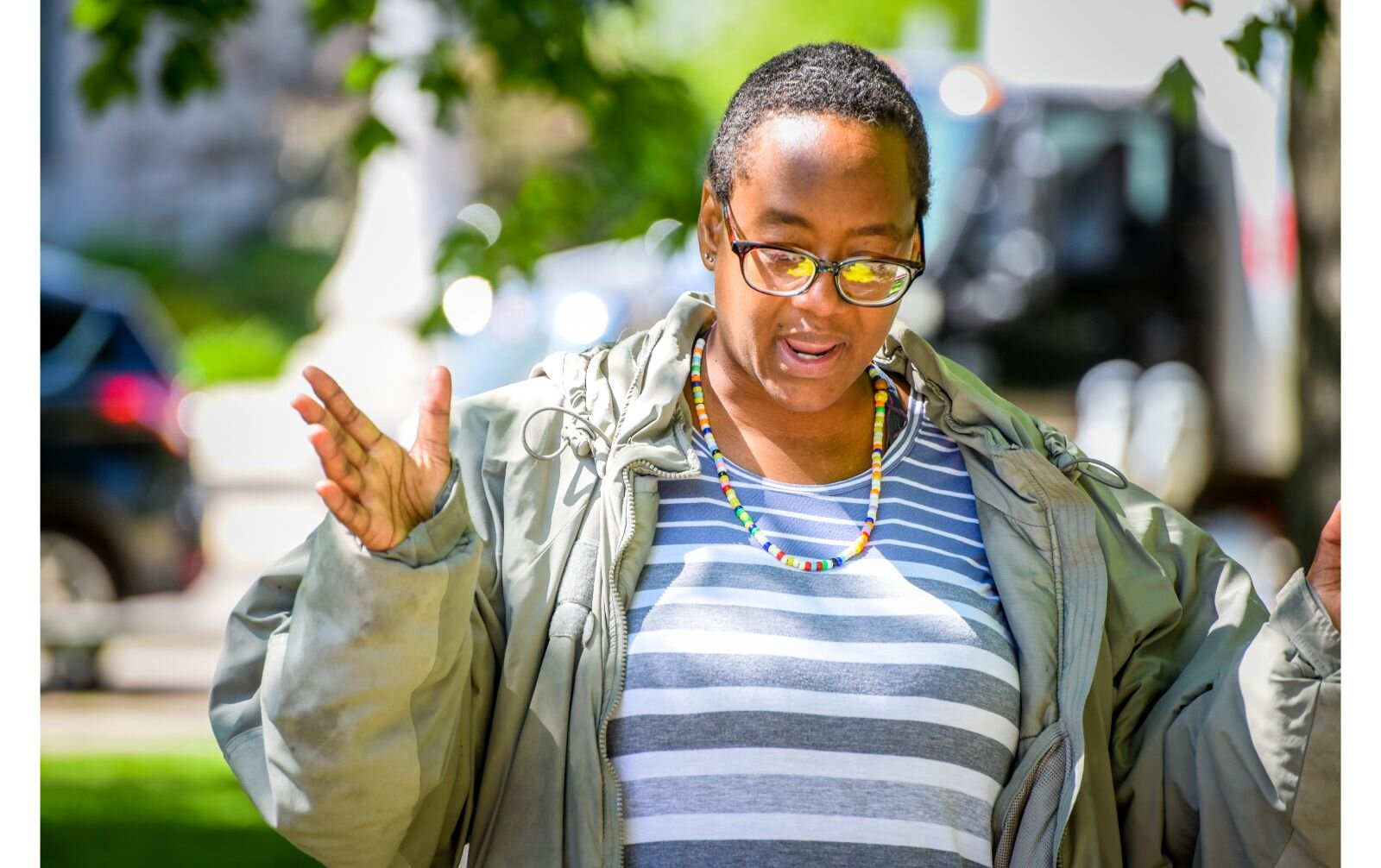
“I had to get out. If I didn’t get out, I’d have left these kids by themselves.”
The trauma of seeking help
Williams has been spending her days since February walking all over Kalamazoo, from the Gospel Mission where she and her children have found shelter, to all the many agencies promising help.
She has faced many frustrations, barriers, and difficult-to-navigate bureaucracies. As of this writing, Williams has a glimmer of hope, a three-bedroom house on the Northside that would be available to her and her children if her latest request for a lease is accepted.
One helper for Williams has been Meg Forrest. An active volunteer advocate for the unsheltered — and the person who connected this journalist with Williams — Forrest has been working to guide people through the voucher system, and has helped some get housing.
Forrest says, “It is incredibly common for people to have this frustration. Tamika is actually much more ‘with it’ than a lot of people, but sometimes even I don’t understand what they have to do (to find help). And a lot of the programs require you to basically sign up and wait because a lot of them have waitlists.”
The search for help can lead to a form of trauma, Forrest says. “It’s just so much trauma even trying to get help, that a lot of people give up on it. Not all of the places, or I guess I should say the people working at the places, really understand that the people they are dealing with are dealing with a lot of trauma, and just trying to navigate the different resources to get help, is a million times harder for them than it is for your average person.
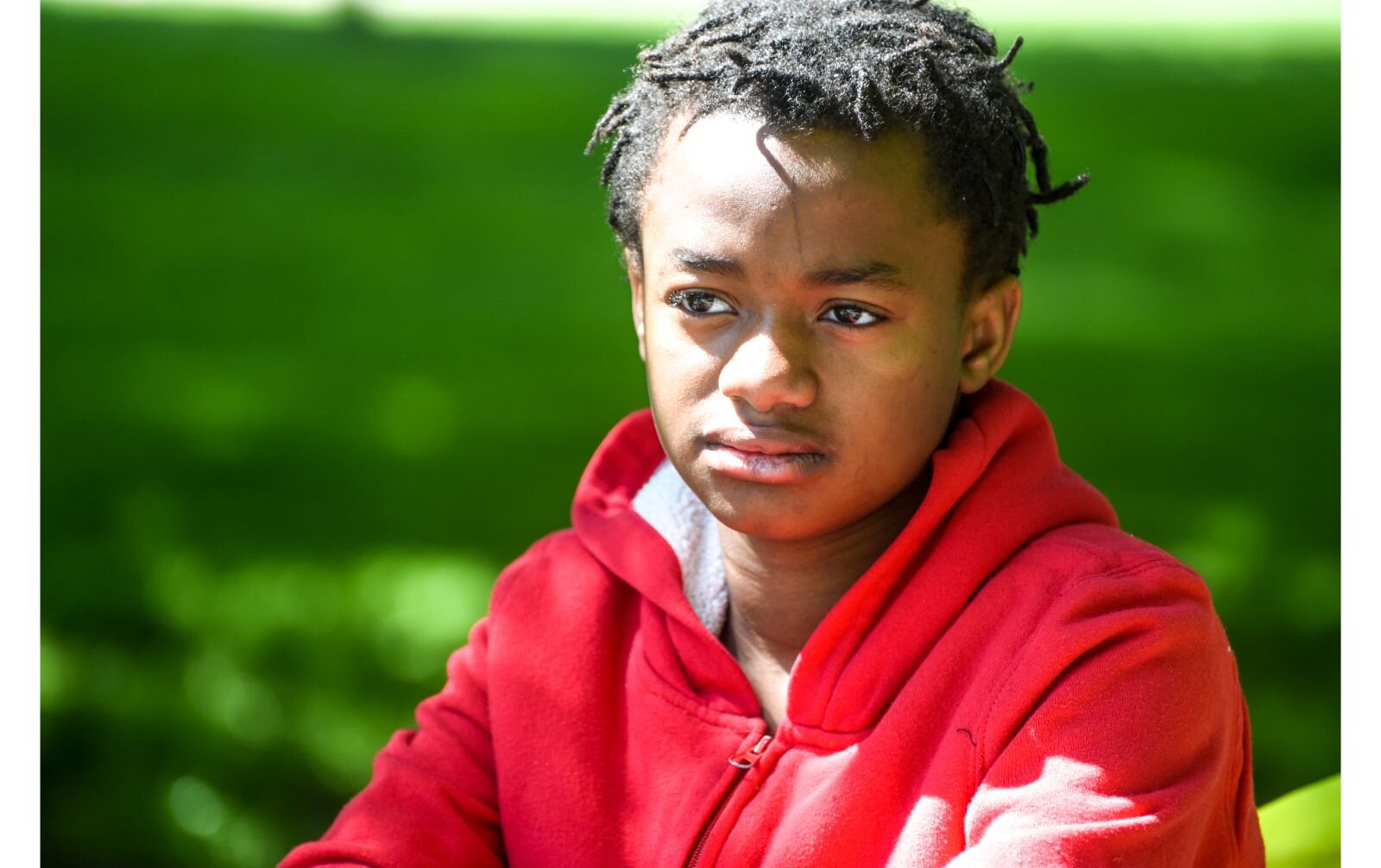
“But the counselors don’t always realize this, and if (an unsheltered person) misses an appointment or doesn’t get some information back to them, they think they just don’t care and stop helping them. So then that person has to start all over with someone else.”
“It’s sad, it’s so sad,” Williams says. “And when you try to find the resources to get the help you need, there’s not too much else that you can do… Basically, you’re on your own.
“I feel like, I know God’s got me, but I just feel like I’m letting my children down, as far as trying to find housing, stuff like that.”
She’s made sure her kids got enrolled in Kalamazoo schools. “Since we’re here in Kalamazoo, it was hard to get schooling, but they do have school. They go to Lincoln.” Williams gets them to school on time, gets them fed, and tries to ensure they feel as safe as the circumstances allow. Her son has a disability, so SSI plus SNAP help with survival.
“I’ve been out on foot every day, trying to get help for them, trying to get the assistance that I needed,” she says.
A secure life ends with abuse
Williams had been living a secure life. She was born in Detroit and lived there until her parents moved to Romulus. She attended Romulus High School with students who were relatives of Pistons players. After graduation, she went to the Michigan Career and Technical Institute in Plainwell and earned a degree in culinary arts.
Food service jobs followed. She worked at the Detroit Metro Airport for eight years, then moved to Jackson, “where I met the kids’ father,” Williams says.

“He was a good guy, he was a decent guy, don’t get me wrong — but like they say, you have stuff hidden in the closet,” she says. “His issues came out.”
She found that her husband had undergone severe sexual abuse when he was 5. “He made it like he didn’t have anything going on, he was fine, wasn’t nothing wrong with him. But technically, he was messed up,” Williams says. “And then it got serious, to the point where I just couldn’t deal with the agony of dealing with all that — and my kids going through it.”
Williams was working as a general tech cook at Albion College, and paying the rent. When she fled, her husband didn’t pick up the payments. She repeats the exact number she owes in back rent, “$1,215,” because it’s been a major barrier to help.
She was about to get a housing voucher this year, but her first application was denied due to the unpaid $1,215.
At the Mission
After leaving her abuser, Williams and her children first went to a hotel, where they stayed for September and October. She quickly realized that was too expensive to be a long-term solution. They moved into the Battle Creek shelter, Inasmuch House. The shelter is primarily for single women and children, but stays are limited to 60 days.
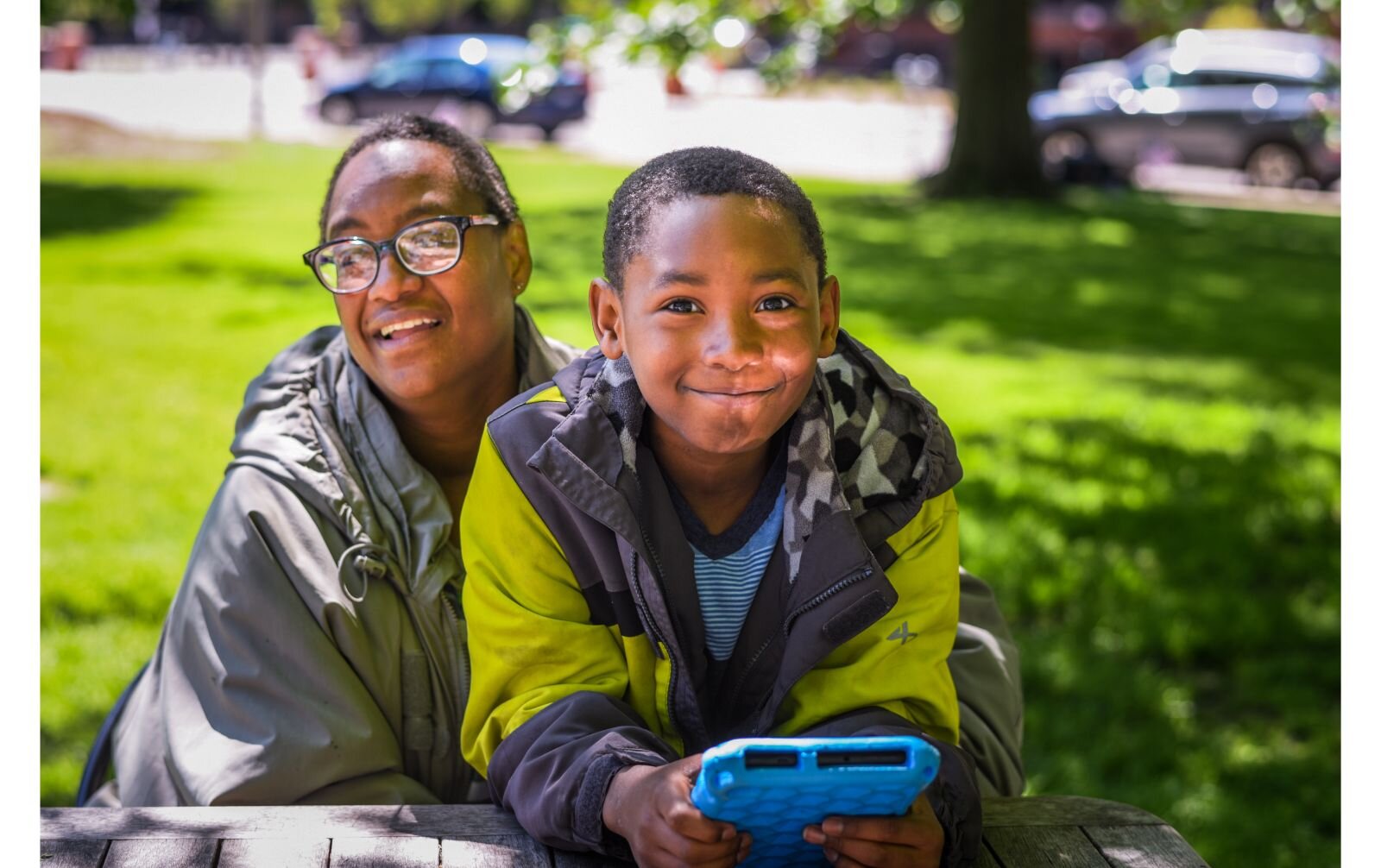
The family moved on to Kalamazoo. Here, “I was hoping to find housing. And it’s been such a struggle trying to find that,” she says. Rents here “are sky-high.”
They landed in the city’s main shelter option, the Gospel Mission.
Williams doesn’t hold back on her opinions of their stay. “They’re very rude. They’re very disrespectful. I had one staff there that literally harassed my children,” Williams says of the Mission. “And we weren’t doing anything. They patted me down like I was a person doing drugs… I’ve never done drugs. And they were patting me down like they were the police.”
At the Mission, Williams says the family has suffered through bed bugs, food that gave her and her children gastric ailments, and cold in the winter.
“It took me three months to get me a room (in the Mission) that wasn’t as bad.”
She was offered a spot in the Mission’s Discipleship program, a year-or-more-long program that gives women and their children an apartment and counseling. Williams says she’s talked to people who’ve gone through the program, got their own place, then were evicted and landed back at the Mission.
The program has rules that Williams thinks would hinder her attempts to get back to a normal life. “Your phone is taken away for almost six months, you only get it for one hour. You have to stay on their campus for three months,” she says.
She needs her phone’s alarm to get her kids up and to school on time. Since she’s currently trying to get an interview to be on the kitchen staff at Bronson, she needs to be reachable. A phone is a vital connection to the rest of society, and a survival tool, for her.
We reached out to Kalamazoo Gospel Ministries for a response, asking if they did ask participants to give up their phones.
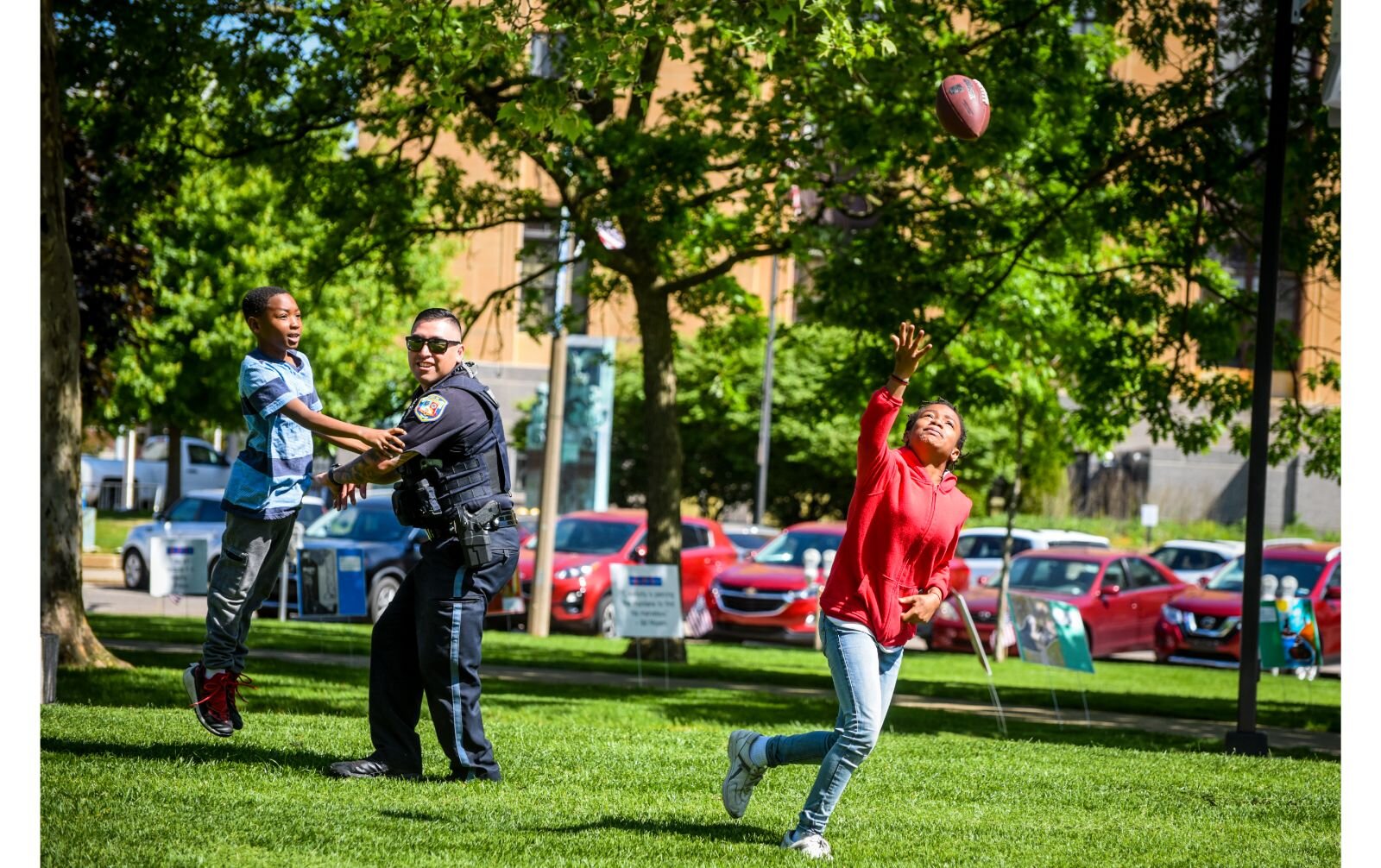
Pastor John Simpson responded to questions sent by email, writing, “We offer a one-year residential program called New Life|New Hope. Applicants must apply to be admitted into the program and all program expectations and requirements are reviewed prior to acceptance into the program. There is an initial period in the program where contact with people outside of the program is limited to one hour a day. This is intended to help minimize technology distractions and to help set appropriate boundaries. We also restrict program members to the property early in the program. As each program member progresses through the program they are allowed more access to their phone and time off our campus. This is very common in most residential programs that are addressing addiction and other life-dominating issues.”
Also, Simpson adds, in response to Second Wave’s questions about Williams’ other concerns that their campus has a security check-in process using metal detectors and a wand. “We do not do any ‘pat downs,'” he writes. Their kitchen has “not failed a regular inspection by the Kalamazoo County Health Department,” and there has not been any bed bug issues.
“We recognize that many of the folks we have served have been through trauma in their lives and that trauma can impact how we view our surroundings and the people we interact with. It is our desire to love every person who comes to us right where they are at and help them achieve whatever goals they have set for themselves,” Simpson writes.
Who’s helping?
Williams has gone to Integrated Services of Kalamazoo. There she got help for her kids’ various learning disabilities, anxiety, and depression.
She recently reached out to Urban Alliance. “They act like they want to help,” she says, but Williams had yet to hear details of a program she was offered.
Williams says she’s gotten some help from Ministry with Community, “but that’s limited.”
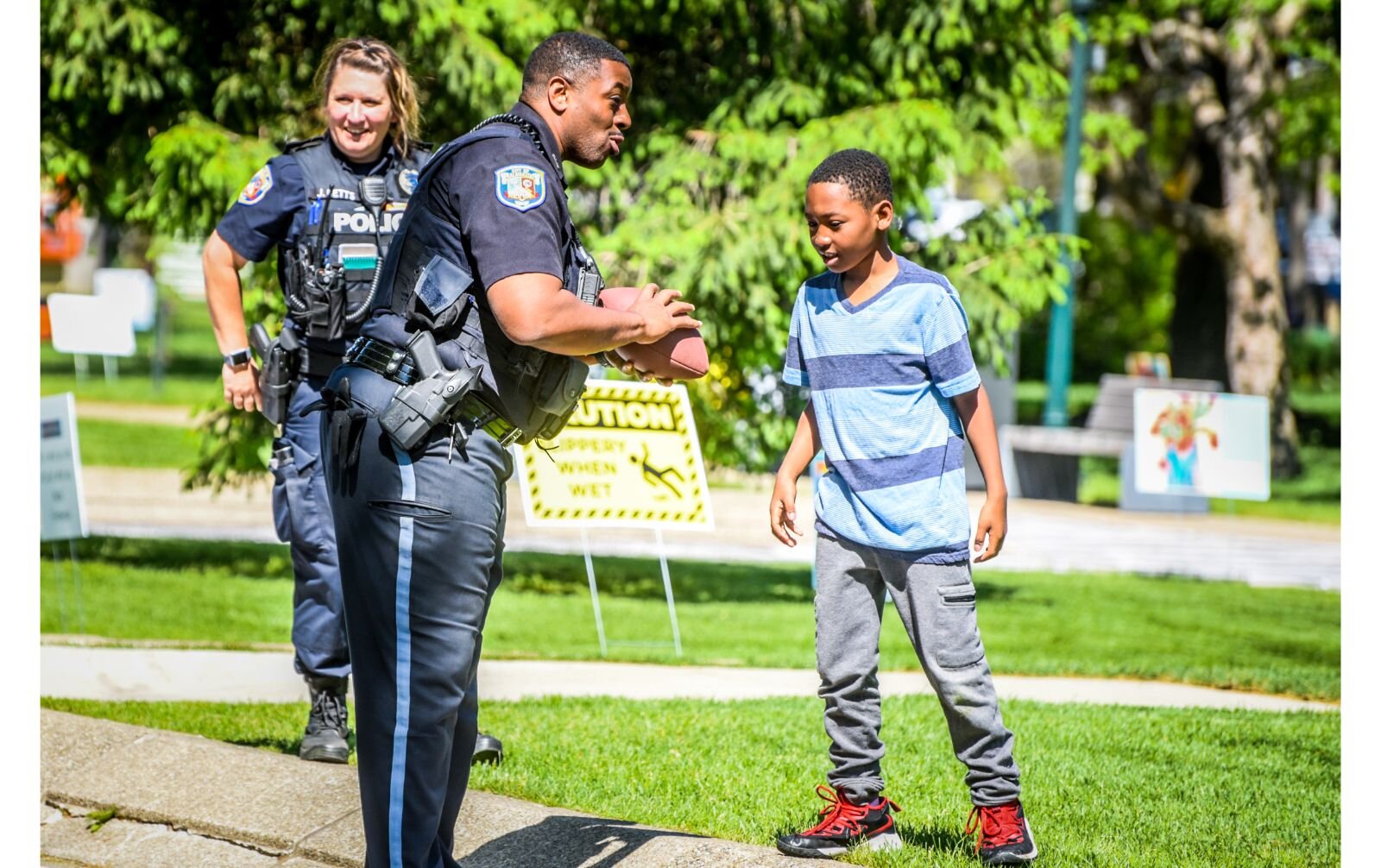
When we spoke, Williams had just heard about Community Services Charity and was preparing to walk down Burdick to their offices. After her visit, Williams says they pointed her to a lot of the same resources she’s already contacted.
Williams had hoped to get into the LodgeHouse, but there were no rooms that could fit her and her three children.
Williams wanted to get low-income housing at Gladeshire Apartments, but found out there’s a “two-year, three-year waiting list.”
She’s frustrated with all the local organizations that promise help but can’t seem to get help to her. “I got told a lot of stories, and it never happened.”
Her biggest issue is that $1,215 she owes in back rent. “Right now, I’m at a wits’ end. I don’t know what else to do. I’ve been turned down by every place I’ve talked to, and now it’s like, what do I do about paying that bill?”
The United Way of South Central Michigan told her they have a program to help with past-due rent, but just for Kalamazoo, not for a property rented in Calhoun County. “I was basically screwed.”
Housing Resources Inc. will help current tenants behind on rent to keep them from eviction, but not someone in her situation, who’s broken a lease in Calhoun County.
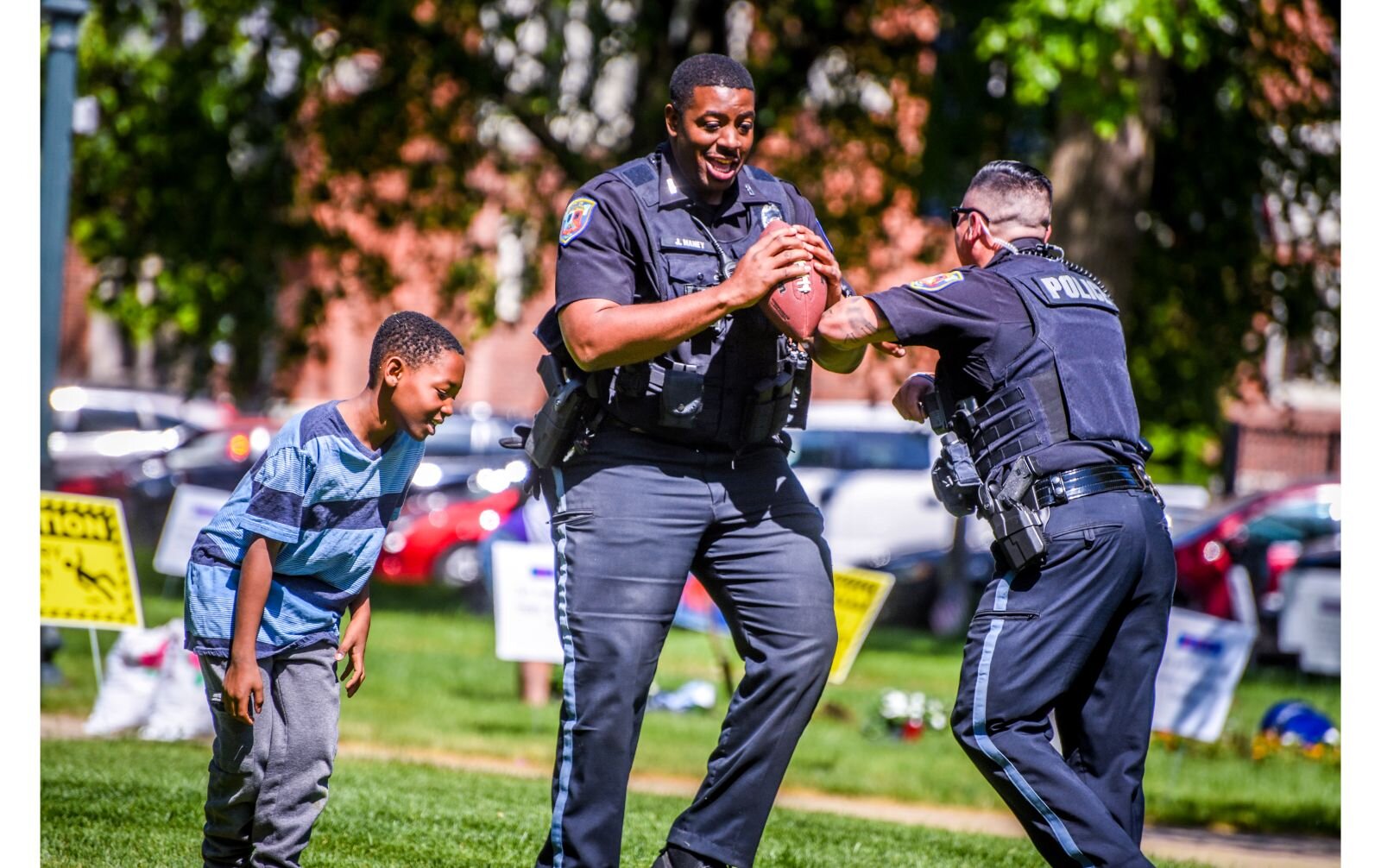
HRI has her undergoing the appeal process to get a housing voucher, but it’s slow going. “It could take up to two weeks, and they’ll have a worker or case manager give me a call.”
Hopeful developments
While struggling to find help, Williams also had to have emergency surgery on an infected appendix earlier this spring. “So it’s been up and down,” she says with a touch of deadpan humor in a later phone call.
“There’s good days and bad days, and there’s days I just want to give up and quit,” she says.

Williams was told at the Mission, “‘There must be a reason that God brought you here.’ Yeah, everybody’s been saying that, but it’s like, I’ve been trying to figure out why am I here? I mean, I know why I’m here, but I’m just saying, to deal with all I have to deal with on a daily basis, trying to find housing, looking for work, all that. It’s just a struggle, and the struggle is real.”
“When you’ve got children looking up to you… They’re looking at you as the hero, so….” Williams says, voice strained.
“I have to do what I have to do for these children.”
Williams’ message to Kalamazoo is, “This community needs more help with helping families that are homeless, especially families. If you don’t have the resources, or if a person is denied because of a back payment, what do you do to help that person move forward?”
Meg Forrest writes, via email, “I honestly wish every single member of the city commission would take one person living in the unhoused community and walk through trying to get them into housing. Then they would see how difficult the process is.”
Forrest has seen people experience “a delay or a little hiccup, and they lose it and want to give up, but just being there and telling them you’ve got their back and you’ll keep calling wherever for them, or tomorrow we’ll go do this, goes a long way.”
“I need to get with Meg,” Williams says, back in the park. “Let her know that, now, since I’m not getting the back rent paid for $1,215, we’re going to have to pull some strings together. She’s really been helping me, and I thank her.”
Forrest writes about Williams’ debt, “I believe if we can get the bill paid on the back rent, then she can appeal the voucher denial. It’s a big barrier and really sucks! This is the first time I’ve encountered it.”
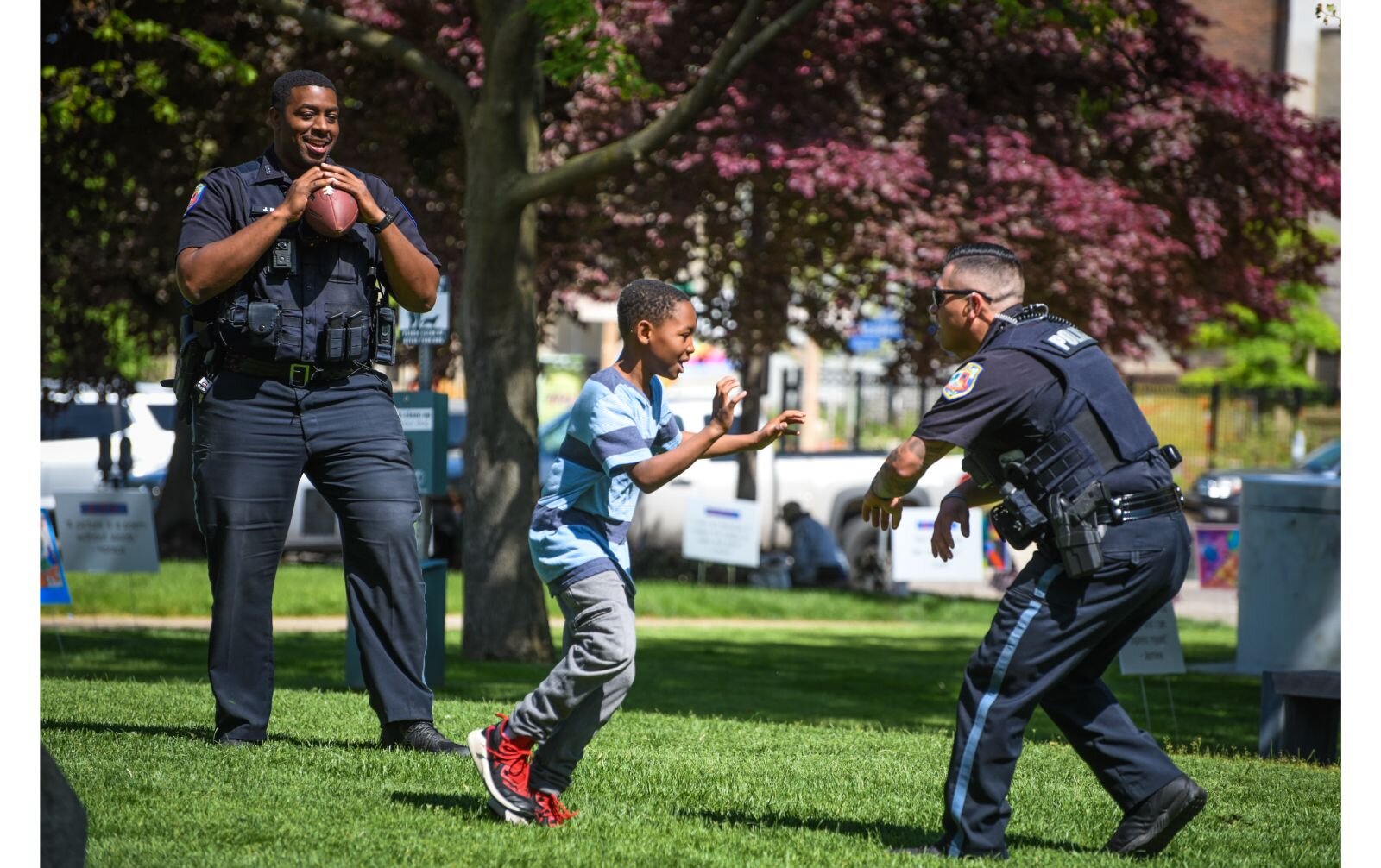
In a later email from June 10, Forrest writes: “I saw her last night when we were serving dinner (for the unsheltered). She said that her counselor from HRI found her a three-bedroom house on the Northside, so she was pretty excited about it…. She put in the application. So hopefully that will work out for her. She really deserves it.”
As of June 13, Williams’ story is at a hopeful to-be-continued point. Forrest emails that she’d talked with Williams that day. “She said she did for sure get a project-based housing voucher, and the program she and her family are in is for children with disabilities.”
Project based vouchers are a collaboration with Pine Grove Housing Service, LLC, agencies like HRI, Residential Opportunities, Inc., YWCA, and others, and properties that devote some or all of their units to voucher-holders.
Williams is now waiting for a response from the property management company to see if she and her children have a new home.
June 20 postscript: Setbacks, but still hopeful
We contacted Williams one last time before publication. The update is she is now in a program through HRI, Permanent Supportive Housing to “help families who have children with disabilities,” Willams says. The program provides a case manager for a year, to help families stay housed, she says.
The housing that looked promising last week is no longer available but another unit might work. She may need a cosigner if she gets a lease, and still has the back-rent issue. “Meg (Forrest) was in the process of trying to help me get that large bill paid off… She talked to the Pine Grove people and said, ‘Look, what is it that we can do?'”
Williams sounds a bit discouraged, but also upbeat. “I’m just waiting to find out what’s going on…. I’m hoping for a happy ending. We’re still down at the Mission, still waiting.”
Her situation is still hopeful?
“Yeah, it is. It’s still hopeful,” she says. “I’m hoping for good news.”

